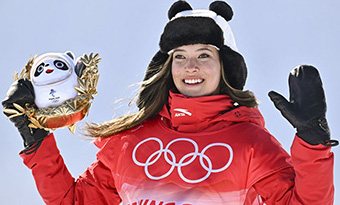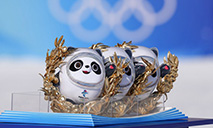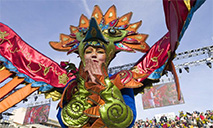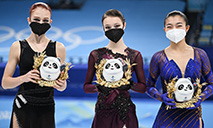China's first Japanese skiing coach watches Beijing Winter Olympics with mixed feelings
NOZAWA, Japan, Feb. 19 (Xinhua) -- Hiroaki Kono felt it hard to express his feeling after watching the Chinese women's cross country team beat their Japanese counterparts at the Beijing Olympic Winter Games.
There was joy and relief for the 70-year-old, who coached the Chinese skiers 42 years ago, one month before they competed in the 1980 Lake Placid Winter Olympics.
And then the result brought him regret and disappointment -- competing at the Olympics for Japan had always been his dream.
"I am happy with the Chinese skiers' progress and at the same time I wish that the Japanese athletes should have done better," he told Xinhua.
Recalling the pitiful moments he met the Chinese athletes in late December 1979, Kono has every reason to feel proud about their performance.
One month after it resumed membership on the International Olympic Committee (IOC), China announced it was to take part in the Winter Olympics for the first time in history. Few people in the world's most populous nation had heard about the Olympic Games, let alone Winter Olympics.
With the help of the Japanese Olympic Committee, some of the Chinese athletes arrived in Japan for a one-month pre-Olympic training. A team of six people, two for alpine and cross country skiing each, plus one coach and one interpreter, were accepted by Nozawa Onsen Ski Resort, where Kono was born and raised.
Kono was shocked to find that the Chinese skiers arrived nearly empty-handed.
"They did not bring skis, boots or other equipment," he said. "And the skiers' level was not higher than that of high school students from Japan's least snowy places like Tokyo."
The Winter Olympics was to open in about 50 days and under very tight time pressure, Kono, who narrowly missed the chance of qualifying for the Olympics by finishing third at the national championships, faced an uphill challenge to plan the training schedule.
"My boss told me I should lift the Chinese athletes to a level that could achieve something at least not too 'embarrassing' at Lake Placid. But I think it is more important to keep them injury-free."
The Chinese split into two groups with Kono bringing the alpine skiers and the coach to the top of the mountain at eight every morning. The interpreter, who could not ski, had to join the cross country team. Kono was forced to communicate with the Chinese skiers with hand gestures or by writing Chinese characters, which Japanese shares. After dinner, Kono gave them lessons on international skiing rules. He was so strict that he would always refuse the Chinese skiers' requests for a nap after lunch.
"I told them that we don't have enough time," he said. "Now is not the time to take a nap."
The Chinese team stayed in Nozawa for about a month and at the end of February 1980, they joined the Chinese delegation who was making a special stopover in Tokyo.
"Maybe it was very hard for me to assess how much they had improved," he said. "But they were really much better skiers when they left Nozawa."
Kono did not know how his students performed at the Winter Olympics until he received a letter about two weeks after the games concluded.
It was written on a sheet of letterhead paper from the Olympic Village, signed by Piao Dongxi and Wang Guizhen.
"We miss you, coach Kono," it read. "Out of 83 athletes, Piao Dongxi finished 50th in the men's giant slalom and 34th in slalom. Wang Guizhen was 36th in the women's giant slalom in a field of 52 competitors and 18th in the slalom event."
Kono framed the letter and hanged it on the walls at his home, keeping it like treasure.
"The most important thing is that they have crossed the finish line and left the Olympics with results," he said. "It was the first Winter Olympics for China, so the performance had special significance not only for themselves but also for their country. I was very proud of them and felt very happy. "
Kono went on to become the president of the Nozawa Onsen Ski Resort before retiring a few years ago. He still works as an adviser of the Ski Association of Nagano.
"Even 42 years ago, I believed that China would catch up with Japan in winter sports," he said. "Chinese women's volleyball team had already done better than the Japanese team at that time. Now you can see that the Chinese athletes can do better than the Japanese athletes in some events. I think winter sports will grow faster in China after the Beijing Olympic Games."
Photos
 Gu wins women's free ski halfpipe, her second gold for China at Beijing 2022
Gu wins women's free ski halfpipe, her second gold for China at Beijing 2022 Beijing 2022 mascot Bing Dwen Dwen rises as an Olympic star as irresistibly cute design wins widespread acclaim
Beijing 2022 mascot Bing Dwen Dwen rises as an Olympic star as irresistibly cute design wins widespread acclaim In pics: Battle of the Flowers parade of 2022 Nice Carnival
In pics: Battle of the Flowers parade of 2022 Nice Carnival Shcherbakova wins as ROC duo finish 1-2 in women's singles figure skating at Beijing 2022
Shcherbakova wins as ROC duo finish 1-2 in women's singles figure skating at Beijing 2022
Related Stories
- Alpine skiing mixed team parallel rescheduled to Sunday
- Feature: I'm not going there for tourism - French skier Lapalus keeps his promise at Beijing 2022
- New Zealand's Nico Porteous claims men's halfpipe gold
- Highlights of freestyle skiing men's freeski halfpipe final
- Norway's Boe wins fourth gold with men's 15km mass start biathlon title at Beijing 2022
- Gu Ailing: I felt like I really deserved a victory lap
- Awarding ceremony of freestyle skiing women's freeski halfpipe at Beijing 2022
- Highlights of figure skating pair skating short program
- Highlights of speed skating men's 1000m of Beijing 2022
- Canada wins bronze medal in men's team curling at Beijing 2022
Copyright © 2022 People's Daily Online. All Rights Reserved.






